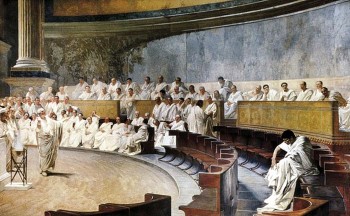Cicero (philosopher, lawyer, statesman and rhetorician) was born 106 BC in Arpinum (now Arpino) in Lazio, a region that was also the home of military reformer Gaius Marius. Cicero was born into the state of the so-called municipal aristocracy (ordo equestris), a socially and economically very good standing in Roman society. But Cicero in roman society was so called “homo novus” because he was not belong to upper oligarchy. According to Plutarch, Marcus Tullius Cicero was a very talented student. With his qualities, Cicero was given the opportunity to study the Roman law from his teacher Quintus Mucius Scaevola Augur. During his education Cicero met a Apollonius Molon from Rhodes who was a famous rhetorician. In addition Cicero learned from Philosopher Philon, who belong Platonic Academy. After completing his education, Cicero was sent to the Forum Romanum for training, where Crassus and Antonius introduced him to the higher art of rhetoric. Marcus Tullius Cicero like his teachers, was occupied with the thought of designing the Roman policy. From the year 81 BC Cicero increasingly gains practical experience in the field of law, so that he can appear in the forum a few years later as a fully trained lawyer. Young Cicero increasingly lost his will for rhetoric. Therefore, he decides to take a break in Greece, which is still considered in this era as a cultural ideal, although the Hellenic community is increasingly falling into decay. In addition to the Athenian philosophers Antiochus of Ascalon, Cicero visits the banished Publius Rutilius Rufus in Smyrna, in Asia Minor. Soon after Cicero goes to Rhodes to meet with his former teacher Apollonius Molon who train him to better understand demands of public speaking.
This phase is shaped by profound, philosophical trains of thought, which are also reflected in his speeches. Cicero also considers the support of the people as important to be able to hold state offices. In times of coup attempts, conspiracies and political cliques, this remains an almost unique finding. Prior to his election to the consul, Cicero first fulfilled the duties of the aedile (69 BC), increasing his popularity in Sicily through the possibility of access to cheap grain. Cicero become praetor in 66 BC. Marcus Tullius Cicero was elected as consul in a difficult period of the Roman Republic. Already in the first round when came the election for consul, all votes of Centuriate Assembly fell to Cicero. While others at that time were trying to seize his power, Cicero was a master of reason and selflessness. Although the defense of the existing order would have required real power, Cicero, even without it, managed to steer the Republic in difficult times. Whe



Cesare Maccari (1840–1919).
Source: Wikimedia
n Caesar, with the aid of the agricultural law of Rullus, a feint, ventured to seize power, the consul defeated it by disclosing to the broader people the intention of this proposed law. Another success of Cicero was the discovery Catiline conspiracy which after Catilina and his followers were sentenced to death. The execution was covered on the one hand by the existing laws and on the other hand by a senate resolution. Catilina and his followers were killed against roman troops led by Quintus Caecilius Metellus Celer and Gaius Antonius Hybrida at the battle of Pistoria 62 BC. All those who saw Cicero as a counter-force to Caesar, described him as a defender of the freedom and the principle of democracy. In the 12 “orationes consulares” puts Cicero’s own person at the center and defends his official acts in free speech form. Opponents saw in it an unbearable glory.
